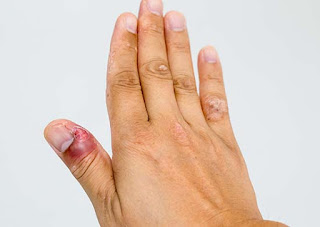"While sickness is not natural, death is." Being ill is a reflection of specific health issues that our body is experiencing as a result of poor decisions and callous disregard for our wellbeing.
thoroughly washing your hands The first line of defense against various infectious diseases is good hand cleanliness. It seems astonishing that the majority of us wash our hands carelessly. The wrong way to wash your hands is just as bad as not washing them at all. Make sure to soap your hands from the back, the spaces between your fingers, and even the region under your nails. For proper hand hygiene, the Centers for Disease Control and Prevention advises scrubbing for 20 seconds. Be aware that alcohol-based hand sanitizers may not completely eliminate all sorts of bacteria, and they do not work on strong chemicals or pesticides.
- How does black fungus start?
One may catch mucormycosis when the fungus enters the skin through a cut, burn or any other types of skin problems. The black fungus sticks to a body part and travels inwards through the nose, sinus or lungs.
If the fungus goes through the sinus, it can affect the eyes and the brain which can lead to a fatal situation.
Can black fungus spread?
The excessive use of steroids and antibiotics and the contamination through the pipes and prongs used for the mechanical supply of oxygen to patients are the main reason for rising in black fungus. Mucormycosis is not contagious which means it does not spread from one person to another. The fungal infection can also occur if clean masks are not worn and the rooms are not ventilated properly.
How to Prevent Mucormycosis Infection?
It is important to stay alert. If diagnosed early it can be treated better with improved outcomes.
Taking
care of diabetes and having well-controlled sugars are the most
important factor to prevent the invasion. Staying in touch with your
endocrinologist and the ID physician post-COVID is also critical.
Contact your nearest Apollo Diagnostics centre or call 9205478479 for
more information on various laboratory tests to be done, as per your age
and medical condition.
- Can humidity affect your allergy?
Humidity is the amount of water vapour in the air. Too much or too little humidity can contribute to asthma, allergies, skin conditions, infections, and general discomfort.
An allergy is the response of the body's resistance system to ordinarily harmless substances, such as pollen, foods, dust. Whilst in most people these substances (allergens) cause no problem, in allergic persons their resistance system detects them as a threat and produces an inappropriate reaction. Some people can enjoy walking through a meadow of flowers, while some can’t stand a single rose or some people could finish a bag of nuts while some can barely make it through a single peanut.
Allergies come in many forms, some are seasonal, some throughout the year while some last a lifetime. Symptoms of medicine or drug allergy are minor reactions such as rash, itching, redness, pain, stinging, hives, swelling of lips, tongue or throat, sneezing, runny nose or a serious allergic reaction called anaphylaxis which is indicated by symptoms such as wheezing, shortness of breath, throat and mouth swelling, nausea, vomiting, diarrhoea, cramping abdominal pain, fall in blood pressure or even fainting. Some common allergy causing substances are:
Drugs - Nearly any drug can cause an allergy but ones most likely to cause allergies are antibiotics, Aspirin, Insulin, monoclonal antibody therapy, muscle relaxers, non-steroidal anti-inflammatory, sulfa, chemotherapy, HIV, anti-seizure drugs.
Foods - Common foods causing allergies are milk, eggs, peanuts, tree nuts, soy, wheat, and fish.
Insects - Allergies are commonly caused by stinging insects such as bees, wasps, hornets, yellow-jackets, fire ants; biting insects such as kissing bugs, bedbugs, fleas, flies or household pests such as cockroaches and dust mites.
Latex - Contact with everyday products made from natural rubber such as balloons, rubber bands, condoms and diaphragms, rubber household gloves, rubber balls, bandages could cause skin allergies
Mould - Spores of fungi such as mould or mildew also cause allergic reactions
Pets - Allergies to pets with fur such as cats or dogs is common
Pollen - Pollen allergy or hay fever is one of the most seasonal allergies caused by pollens released by trees weeds and grasses.
Allergy issues are widespread and nearly everyone we know would be allergic to a certain substance. If you suspect that you or your loved ones are continuously suffering from an allergic reaction, it is best to approach a clinic offering diagnostic services to rule out serious reactions. An allergy is typically diagnosed in three steps:
Personal and medical history - Detailed medical and personal history will be noted by the doctor to assess the symptoms and their possible causes. Prepare by keeping track of medicines you take, family history and general lifestyle at home, office or school.
Physical examination - Based on the history, if the doctor suspects you have an allergy he will closely examine your eyes, ears, nose, throat, skin and chest. To determine how well your lungs are functioning the doctor may also conduct a pulmonary function diagnostic test or even prescribe an x-ray for the lungs.
Laboratory tests to identify your allergens - For further diagnosis, your doctor may have to do a skin, patch or blood test such as skin prick test, intradermal skin test, specific IgE blood tests, physician-supervised challenge tests. While a laboratory test result is not conclusive of an allergy, it is a rather useful tool in allergy diagnosis.
It is very important to curb allergies at a nascent stage else they could aggravate to serious conditions. If you have the slightest suspicion that you may be suffering from an allergic reaction, consult a specialized diagnostic service like Apollo Diagnostics centre at the earliest.



